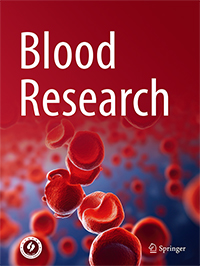Original Article
 Split Viewer
Split Viewer
Blood Res 2015; 50(4):
Published online December 31, 2015
https://doi.org/10.5045/br.2015.50.4.235
© The Korean Society of Hematology
The prognostic value of glucocorticoid receptors for adult acute lymphoblastic leukemia
1Hematology Department, Medical Research Institute, Alexandria University, Alexandria, Egypt.
2Chemical Pathology Department, Medical Research Institute, Alexandria University, Alexandria, Egypt.
3Department of Clinical Pathology, Medical Military Academy, Cairo, Egypt.
Correspondence to : Correspondence to Ahmed M. L. Bedewy, M.D. Hematology Department, Medical Research Institute, Alexandria University, 8 Mahmoud Younes Street, Smouha, 21615 Alexandria, Egypt. Tel: +201000040511, dr_ahmed_bedewy@yahoo.com
This is an Open Access article distributed under the terms of the Creative Commons Attribution Non-Commercial License (http://creativecommons.org/licenses/by-nc/4.0) which permits unrestricted non-commercial use, distribution, and reproduction in any medium, provided the original work is properly cited.
Background
Therapeutic protocols used in adult acute lymphoblastic leukemia (ALL) are widely variable, and glucocorticoids (GCs) are essential components in ALL treatment. Therefore, this study aimed to evaluate the distribution of prominent glucocorticoid receptor (GR) gene polymorphic variants among adult ALL patients. We also investigated the association between GR messenger ribonucleic acid (mRNA) isoform expressions and the response to chemotherapy.
Methods
Fifty-two newly diagnosed Philadelphia-negative adult ALL patients and 30 healthy control subjects were enrolled in this study. Genotyping was carried out using a polymerase chain reaction (PCR)-restriction fragment length polymorphism analysis. GR mRNA isoform expressions were assayed by quantitative real-time PCR.
Results
ALL patients in this study had a median age of 34 years (range, 18-75). GRα expression was associated with complete remission (
Conclusion
Our data suggest that the level of GR isoform expression may be useful in predicting GC response, achievement of complete remission, and better event-free survival in ALL patients. However, further evaluation with a larger cohort of patients is warranted.
Keywords Glucocorticoid receptor, Genetic polymorphism, Acute lymphoblastic leukemia
Article
Original Article
Blood Res 2015; 50(4): 235-241
Published online December 31, 2015 https://doi.org/10.5045/br.2015.50.4.235
Copyright © The Korean Society of Hematology.
The prognostic value of glucocorticoid receptors for adult acute lymphoblastic leukemia
Ahmed M. L. Bedewy1*, Shereen M. EL-Maghraby1, Noha S. Kandil2, and Waleed R. El-Bendary3
1Hematology Department, Medical Research Institute, Alexandria University, Alexandria, Egypt.
2Chemical Pathology Department, Medical Research Institute, Alexandria University, Alexandria, Egypt.
3Department of Clinical Pathology, Medical Military Academy, Cairo, Egypt.
Correspondence to:Correspondence to Ahmed M. L. Bedewy, M.D. Hematology Department, Medical Research Institute, Alexandria University, 8 Mahmoud Younes Street, Smouha, 21615 Alexandria, Egypt. Tel: +201000040511, dr_ahmed_bedewy@yahoo.com
This is an Open Access article distributed under the terms of the Creative Commons Attribution Non-Commercial License (http://creativecommons.org/licenses/by-nc/4.0) which permits unrestricted non-commercial use, distribution, and reproduction in any medium, provided the original work is properly cited.
Abstract
Background
Therapeutic protocols used in adult acute lymphoblastic leukemia (ALL) are widely variable, and glucocorticoids (GCs) are essential components in ALL treatment. Therefore, this study aimed to evaluate the distribution of prominent glucocorticoid receptor (GR) gene polymorphic variants among adult ALL patients. We also investigated the association between GR messenger ribonucleic acid (mRNA) isoform expressions and the response to chemotherapy.
Methods
Fifty-two newly diagnosed Philadelphia-negative adult ALL patients and 30 healthy control subjects were enrolled in this study. Genotyping was carried out using a polymerase chain reaction (PCR)-restriction fragment length polymorphism analysis. GR mRNA isoform expressions were assayed by quantitative real-time PCR.
Results
ALL patients in this study had a median age of 34 years (range, 18-75). GRα expression was associated with complete remission (
Conclusion
Our data suggest that the level of GR isoform expression may be useful in predicting GC response, achievement of complete remission, and better event-free survival in ALL patients. However, further evaluation with a larger cohort of patients is warranted.
Keywords: Glucocorticoid receptor, Genetic polymorphism, Acute lymphoblastic leukemia
Fig 1.

Fig 2.

Kaplan-Meier chart showing event-free survival for the
-
The primer sequences and restriction enzymes used for the PCR-RFLP. Abbreviations: RE, restriction enzymes; PCR-RFLP, polymerase chain reaction-restriction fragment length polymorphism..
-
Laboratory and clinical findings in adult ALL patients in relation to the response to induction chemotherapy. a)
P value of Fisher Exact test, b)P value of chi-square test..Abbreviation: ALL, acute lymphoblastic leukemia..
-
Expression of GR mRNA isoforms and their relation to different demographic, laboratory, and clinical parameters. Abbreviations: GR, glucocorticoid receptor; mRNA, messenger ribonucleic acid; Min, minimum; Max, maximum..

Article Tools
Stats or Metrics
Related articles in BR
-
Impact of CYP1A1 variants on the risk of acute lymphoblastic leukemia: evidence from an updated meta-analysis
Imen Frikha, Rim Frikha, Moez Medhaffer, Hanen Charfi, Fatma Turki and Moez Elloumi
Blood Res 2024; 59(): -
Prognostic impact of total body irradiation dose in pediatric acute lymphoblastic leukemia patients treated with allogeneic hematopoietic stem cell transplantation in second complete remission
Wonjin Jang, Suejung Jo, Jae Won Yoo, Seongkoo Kim, Jae Wook Lee, Pil-Sang Jang, Nack-Gyun Chung, Bin Cho
Blood Res 2022; 57(4): 256-263 -
Immunoglobulin repletion during blinatumomab therapy does not reduce the rate of secondary hypogammaglobulinemia and associated infectious risk
Stephanie Wo, Hannah Levavi, John Mascarenhas, Marina Kremyanskaya, Shyamala Navada, Michal Bar-Natan, Sara S. Kim
Blood Res 2022; 57(2): 135-143




 PDF
PDF Standard view
Standard view Export citation
Export citation Share
Share  Download
Download Previous Article
Previous Article



